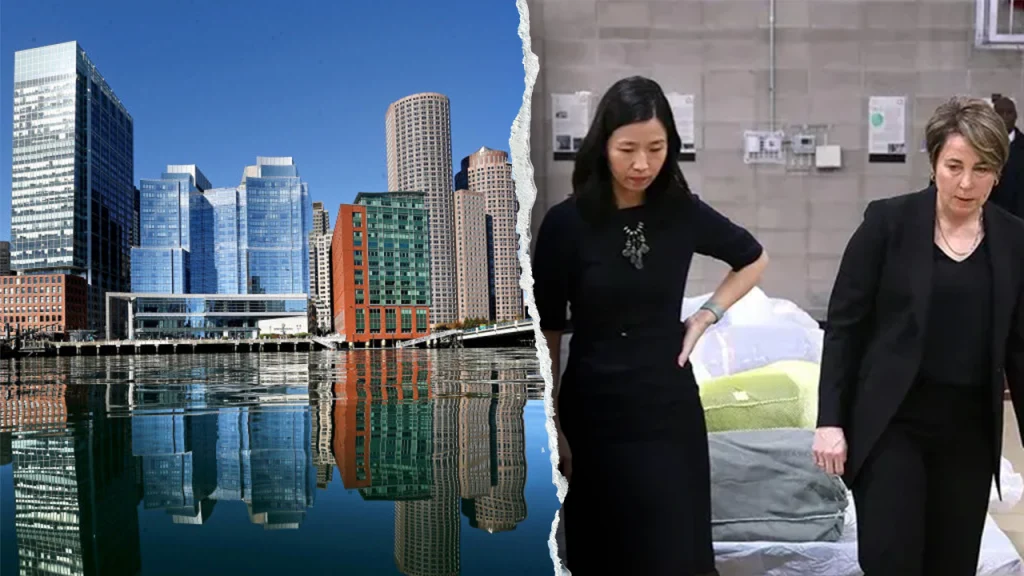Crime Concerns Rise in Massachusetts as Officials Resist Federal Intervention
In the heart of Massachusetts, a state known for its rich history and vibrant communities, tensions are brewing between local Democratic leadership and federal authorities over public safety concerns. Jon Fetherston, a former manager of a state-funded migrant shelter in Marlborough, has come forward with alarming claims about increasing crime rates following Governor Maura Healey’s decision to close the shelter system. According to Fetherston, this closure has led to disturbing consequences, with reports of domestic violence, sex trafficking, shoplifting, and automobile accidents spreading throughout Massachusetts communities. “The Healey hotels were well known for having sex trafficking, domestic violence. We’ve reported cases of rape, unfortunately,” Fetherston explained, expressing deep concern that these issues have now been distributed across the state’s cities and towns rather than being addressed systematically.
The situation has become increasingly political as Governor Healey has strongly opposed potential federal intervention in Boston, characterizing such efforts as “political theater” and “power grabs” by the Trump administration. This resistance comes despite Fetherston’s claims that crime has notably increased, particularly in Boston, which he describes as being in “great decline” from its former status as a premier American city. “Your eyes tell you all you need to know. Crime is on an uptick in Boston. Things are not good,” Fetherston stated, painting a picture of a once-great urban center now struggling with open drug use and escalating crime rates. His testimony suggests a disconnect between official narratives about public safety and the reality experienced by residents and business owners across the state.
Boston Mayor Michelle Wu has joined Governor Healey in resisting federal intervention, asserting that Boston remains “the safest major city in the country” and that the city consistently follows all applicable laws. Wu has accused the federal administration of “attacking cities to hide their own failures,” positioning the dispute as one about local autonomy rather than public safety concerns. This stance has prompted a strong response from Acting ICE Director Todd Lyons, who has threatened to “flood” Boston with federal agents—a move that Fetherston, despite his Democratic background, says would be welcome in communities experiencing increased crime. The former shelter manager expressed dismay at elected officials who, in his view, fail to prioritize public safety: “How any elected official could not put public safety as the biggest priority of any job that they do, it’s disgusting to me and it’s very concerning.”
The controversy extends beyond Massachusetts, reflecting a broader national debate about crime, immigration, and the appropriate boundaries between federal and local authority. Fetherston referenced the high-profile case of Harjinder Singh, an undocumented immigrant allegedly involved in a fatal accident in Florida, to illustrate his concerns about unlicensed drivers. He believes that many Massachusetts residents, particularly those in crime-affected areas, would welcome federal assistance: “I’ve talked to business owners, I’ve talked to local law enforcement, anybody who wants to have a sensible conversation about fixing crime in their community, they support what the president’s doing.” Fetherston also sought to dispel what he sees as misconceptions about the nature of federal intervention, emphasizing that it would not involve military-style occupation but rather additional resources for law enforcement.
This standoff occurs against the backdrop of what some see as a successful federal crime intervention in Washington, D.C., where Democratic Mayor Muriel Bowser has reportedly celebrated reductions in violent crime following federal assistance. White House spokeswoman Abigail Jackson highlighted this example in criticizing the Massachusetts officials, suggesting that “if these Democrats focused on fixing crime in their own cities instead of doing publicity stunts to criticize the President, their communities would be much safer.” Jackson characterized the resistance as stemming from “Trump Derangement Syndrome” rather than substantive policy disagreements, arguing that crime reduction “should not be a partisan issue” but has become politicized by Democratic opposition.
At its core, this Massachusetts controversy reveals the complex interplay between immigration policy, public safety concerns, and political dynamics in American communities. While Governor Healey and Mayor Wu maintain that federal intervention represents unwelcome interference in local affairs, Fetherston and others argue that rising crime demands a more cooperative approach between levels of government. The debate touches on fundamental questions about how communities balance compassion for vulnerable populations with the need for public order, and how political leaders navigate their responsibilities to diverse constituencies in polarized times. As Boston and other Massachusetts communities continue to grapple with these challenges, residents find themselves caught between competing visions of public safety and governance, with no clear resolution in sight as federal and state officials remain at odds over the appropriate path forward.


